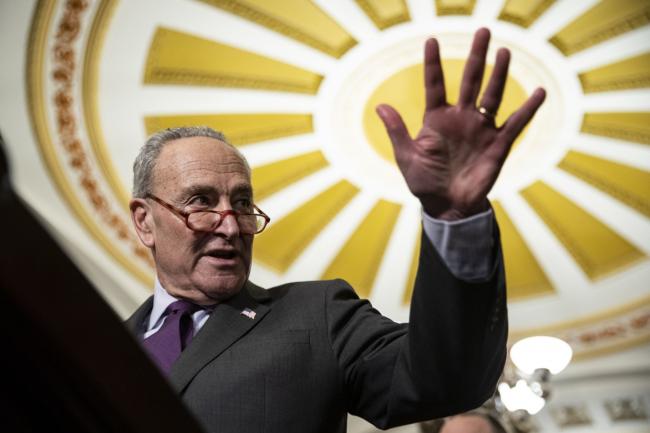(Bloomberg) -- Senate leaders struck a deal to expedite a vote on legislation to avert a nationwide freight-rail strike that would hobble an already fragile US economy.
Senate Majority Leader Chuck Schumer said the chamber would vote Thursday on a House-passed bill that would impose an agreement hammered out by rail companies, union leaders and the Biden administration months ago but rejected by workers in four of 12 unions.
The House on Wednesday cleared the bill on a bipartisan 290-139 vote as well as a related piece of legislation that would revise the original deal to add seven days of paid sick leave to the contract, one of the sticking points between unions and companies.
Under usual Senate procedures, it would have taken days to clear the legislation. But facing a Dec. 9 deadline when a strike could begin, President Joe Biden prodded the Senate to act swiftly.
“Without action this week, disruptions to our auto supply chains, our ability to move food to tables, and our ability to remove hazardous waste from gasoline refineries will begin,” Biden said Wednesday. “The Senate must move quickly and send a bill to my desk for my signature immediately.”
The sick leave issue has been taken up by an unlikely coalition of progressive and conservatives.
House Speaker Nancy Pelosi added the separate bill after progressive House Democrats threatened to tie up the legislation. In the Senate, Bernie Sanders, a Vermont independent, is leading the push for a vote amending the Senate bill with a sick leave provision. While the outcome of that vote isn’t clear, some conservative Republicans also have taken note of labor complaints about leave.
“I don’t believe Congress should step in and reflexively side with management in this dispute,” said Senator Ted Cruz, a Texas Republican. “I think the concerns being raised by the union members and the membership that voted on these arrangements, I think those concerns are quite reasonable.”
Senator John Thune of South Dakota, the No. 2 GOP leader, told a panel of Bloomberg editors and reporters in Washington Tuesday that while many Republicans would prefer not to have Congress intervene, a “significant” number would likely vote for the House bill. He said he thought the paid sick provision would not get 60 votes, however.
Congress can pass legislation to keep the railroads operating under the Railway Labor Act.
A rail shutdown would escalate inflation, cost 700,000 jobs across multiple industries and chop $160 billion from the economy, possibly tipping the economy into recession, according to a study by the American Chemistry Council.
US chemical manufacturers alone ship 33,000 rail carloads per week worth $2.8 billion. Rail operators were set to begin slowing down operations as soon as this week in preparation for a strike, in part to make sure cargo isn’t left stranded.
©2022 Bloomberg L.P.
